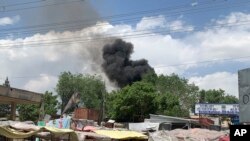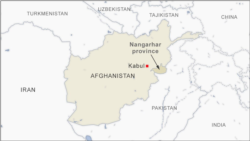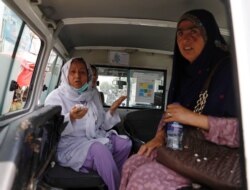The suicide bombing of a funeral in an eastern province, claimed by Islamic State, and a militant raid on a hospital in the capital, Kabul, have killed around 40 people and injured scores of others, officials in Afghanistan say.
A provincial government spokesman in Nangarhar said that scores of people were present Tuesday morning at the funeral for an influential Afghan community police commander, who died of a heart attack the night before, when a suicide bomber blew himself up there.
In a late-night statement, IS took responsibility for the bombing, saying it was the work of the Middle Eastern terror outfit's regional affiliate, Khorasan Province (ISKP). It claimed the blast inflicted heavy casualties on the gathering of "Afghan security forces and militiamen," according to Site Intelligence, which provides alerts and translations of jihadist media outlets.
Separately, a group of unknown gunmen stormed the government-run hospital in the Dasht-e-Barchi area of Kabul, killing at least 14 people and injuring 15 others. Officials said women, nurses and at least two newborn babies were among the dead and wounded.
No one claimed responsibility for the hospital attack, but the Taliban insurgency denied involvement, prompting suspicions that Islamic State terrorists might have plotted the bloodshed.
IS took credit for Monday's coordinated bomb blasts in Kabul, though the violence only caused injuries to a few people.
Interior Ministry spokesman Tariq Aryan told reporters Tuesday that security forces quickly engaged the assailants and ended the hospital siege after an hourslong gun battle. He said more than 80 civilians, including women and children, had been rescued in the process.
Witnesses and officials reported several explosions during the siege, saying the attackers were disguised as Afghan security forces.
The 100-bed hospital largely provides maternal care services with the support of Doctors Without Borders, the France-based global humanitarian organization. The hospital is in an area of the city with a predominately minority Hazara Shi'ite population.
IS has claimed credit for almost all recent deadly attacks on Hazara rallies and worship places in Kabul.
Afghan President Ashraf Ghani, in a brief nationally televised speech Tuesday night, condemned the bloodshed. He also directed Afghan security forces to resume "offensive operations against Taliban and other terrorist groups."
Ghani justified the decision, saying the Taliban has ignored calls for a reduction in violence or cease-fire and instead intensified insurgent attacks.
Global reaction
Tuesday's attacks drew widespread domestic and international denunciation.
In Washington, the State Department said the dual attacks during the holy month of Ramadan and amid the threat of coronavirus pandemic are particularly appalling.
"Any attack on innocents is unforgivable, but to attack infants and women in labor in the sanctuary of a hospital is an act of sheer evil," the statement said.
Noting that the Taliban have denied any responsibility and condemned both the attacks as heinous, the U.S. statement called on the Afghan government and the Taliban to cooperate to bring the perpetrators to justice.
The United Nations office in Afghanistan expressed "shock and revulsion" at the terrorist attacks and called for those responsible to face justice.
Amnesty International denounced the violence, saying Afghan authorities must ensure protection of civilians and hold perpetrators accountable.
"The unconscionable war crimes in Afghanistan today, targeting a maternity hospital and a funeral, must awaken the world to the horrors civilians continue to face," tweeted the global watchdog.
Violence in Afghanistan
Tuesday's violence came a day after the Afghan intelligence agency announced it had captured three key Islamic State commanders during an operation in Kabul. The suspects included the terrorist outfit's leader for South and Far East Asia operations, said the National Directorate of Security (NDS).
Last week, NDS forces raided an IS cell in the capital, killing and capturing several militants. The spy agency claimed the men were responsible for plotting recent high-profile attacks in Kabul, including a gun-and-bomb raid on a place of worship for the minority Afghan Sikh community.
Afghanistan has lately experienced a spike in Taliban attacks and counterinsurgency operations by government forces, killing dozens of combatants on both sides.
The rise in battlefield violence threatens to derail a landmark peace-building agreement the United States signed with the Taliban in February.
President Ghani's orders Tuesday for his Afghan security forces to resume attacks on the Taliban is expected to intensify hostilities across the turmoil-hit nation, dealing a fresh blow to the troubled U.S.-led peace initiative.
The insurgent group insists it is honoring the deal by refraining from attacks on U.S.-led international forces and targets in Afghan urban centers.
Taliban fighters, however, have attacked local security forces and bases, maintaining that cessation of those attacks would be discussed when Afghan parties to the war begin peace talks proposed in the U.S.-Taliban agreement.
The intra-Afghan dialogue is supposed to start when a slowly moving prisoner swap between the Afghan government and the Taliban is concluded, with Kabul releasing up to 5,000 insurgent inmates in return for 1,000 Afghan security forces in Taliban custody.






